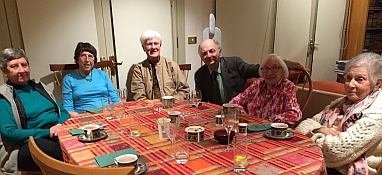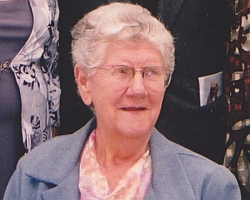Winter 2015
| Editorial
Anna & Nelson welcome baby Zali Jay Soans Eulogy: Jean McKendry-Paterson Reflections on Gallipoli – review |
Editorial
I hope that this may give some focus to contributions you might make to the newsletter and I look forward to hearing your ideas well before spring! Suzanne Yanko, Editor About “Ordinary” With the arrival of this issue of Mark the Word we come, coincidentally, to the end of the Easter season of the church’s liturgical calendar and embark into “Ordinary” time. “Ordinary” has here the sense not of “normal” or “un-special” but “numbered” – ordinal – time, in which the Sundays are simply numbered sequentially rather than being numbered according to their place within a particular festive season (Advent, Lent, etc.). The Ordinary numbering actually begins after Epiphany and then breaks off at Lent before resuming again after Pentecost. None of this really “matters” in a faith sense, of course, although it can help to make sense of the odd sequences of numbers on lectionary listings or pew sheet covers! More important here is the idea which has developed that Ordinary is a period of growth and consolidation in faith and service between the end and the next beginning of the Christmas-to-Easter cycle. Over the last couple of months two groups have met to discuss a thin but still very substantial book on the theme of the resurrection of Jesus. It was a challenging read, both in terms of the writer’s very dense style and in terms of his teasing out of the New Testament’s proclamation of Jesus’ resurrection. Most of us felt well extended in our understandings after spending that time with the author and with each other in exploring what it means to declare, “Jesus is risen”. In late July another discussion series will commence, this time considering a writer from the more “progressive” end of the theological spectrum. On the one hand, this is not where I find myself personally; on the other, a great many people have found this way of thinking about Christian faith appealing, not least for a lack of access to clearly articulated, credible and coherent accounts of Christian faith from more orthodox perspectives. The interest in progressive theology deserves attention and the proposals in this kind of material should be mined for all the good it can provide the modern church. So we will have a look at a book by Marcus Borg in July and August – Meeting Jesus again for the first time – and then look somewhere else for another study later in the year. There is, of course, more to growth in faith than just thinking about it; prayer, deepened fellowship and strengthening our commitment to serve others are some other ways in which we also grow. At the same time, the opportunity to dialogue at depth about what we believe and why, to test thoughts in a safe environment and to be stretched to think – and believe? – new things is rare these days. I encourage all in the congregation to try to get to a couple of these discussion groups in the course of a year; if the times don’t suit and you are keen, let me know and we will find another space for a group. I am also interested to hear what kinds of things you would find it helpful to have considered in groups like these. Anna & Nelson welcome baby Zali Jay Soans
Eulogy: Jean McKendry-Paterson
I think Jean would have wanted me to make it clear that she was no Goodie Two-shoes and that virtue and virtuous are words she would never have used about herself. I remember a Friday night many years ago when the North Melbourne Football Club was architecturally very different from what it has become now. In those days I was in the habit of strolling down there on a Friday to enjoy a beer or two with some chums in the Social Club. Now, having pursued my secondary and tertiary education under the heavy moral hand of Methodism, I still carried an irrational fear of being sprung during a bibulous indulgence by some authoritarian lemon-sucker or Mother Grundy. On this particular Friday night I found myself in direct encounter with one of the senior members of the congregation of what was still the Curzon St. Uniting Church – Jean McKendry, who had come down for her weekly flutter on the pokies. She gave me an impish grin; mine was more sheepish, as I said “I won’t tell on you if you don’t tell on me.” She gave me a gentle elbow in the ribs and a mischievous wink, which readily reassured me. Years later I would playfully greet her with the question, “Have you been a good girl?” or bid her goodbye with the direction, “You be a good girl now.” I always got the same reply, with a naughty glint in her eye, “No. I don’t want to be a good girl. I want to be a naughty girl.” And we’d both chuckle conspiratorially. I could never imagine, though, just what Jean’s naughtiness consisted in, but I am certain that it was very strongly tinged with innocence. So when I once introduced a friend of mine to her, I did so with the words, “Jean is one of the goodest people you will ever meet.” She flinched noticeably, though not at the grammatical distortion. But despite my reverential love of the English language, I chose the word advisedly and uttered it deliberately. For Jean was one of the goodest people I have ever met – not best, which might mean all sorts of things, and certainly not virtuous, which is far too saccharine for her kind of goodness. The essence of Jean’s goodness was to be found in her simple yet powerful philosophy of life. It was in her nature – not something intellectually worked out or a rule laid down and fearfully obeyed – it was in her nature to live her life in the best interests of others. If it might help someone for her to sacrifice herself in some way, she would cheerfully do it. If her warm smile or a kind word would make someone happy, then that would be readily forthcoming. Literally she clothed the near naked, put a roof over the heads of the homeless, brought comfort to the lonely and cheered and strengthened the troubled. Jean was born into a humble working-class family in January, 1928. They lived in turn in Richmond, Carlton and North Melbourne many years before the yuppies and the renovators moved in. She learned early in her life what it was to struggle, to make do with little or even go without altogether. The would-be dressmaker learned from an early age just what sort of a suit she could cut from her cloth. I asked her when she joined our church and she couldn’t remember exactly, but said she was only a little girl going to the Sunday school. Later her parents followed her to church, and when she was in her mid-teens her attendance at church had become a genuine Christian commitment. She remembers her minister talking of the uselessness of sitting on your backside having nice ideas, saying that what was really important was to get up and do. The Gospel is a way of life, not lovely literature to swoon at on Sundays. So Jean got up and did, and didn’t she do what she did! And it was always with a constantly warm smile and a buoyant sense of humour. We need to remind ourselves that the inner suburbs of Melbourne, including our North Melbourne, were vastly different from what they are now, for more than a decade or two after the Second World War. They were predominantly working-class, industrial and slummy, harbouring all sorts of deep-rooted social problems. Thus someone, at some time, saw the need for a North Melbourne Progress Society, and Jean McKendry saw the need to belong to it. Later she founded the North Melbourne Elderly Citizens Club in 1956 and was a founding member of the North Melbourne Senior Citizens Club. A constant problem for many elderly people, particularly those who have become widowed, is loneliness and an absence of meaningful activity. In providing space for social gatherings – first in the Town Hall and then in the early seventies, in the present accommodation in Melrose St. – elderly people were able to get out of the house and meet with one another, to share their stories, their joys and their problems, and engage in meaningful activities that might have restored some sense of purpose to their lives. The pain of loneliness must certainly have been alleviated. Jean was very keen to encourage the University of the Third Age to offer classes at the Centre in Melrose St., and she also established art classes there. One of her special babies was the annual art exhibition, not just a notable cultural feature of life in North Melbourne but also a significant fundraiser for the Centre. Jean served on a number of Melbourne City Council committees and acted as a consultant to the Council on the special needs of the elderly. She worked closely with the Salvation Army and the Society of St Vincent de Paul in providing services to homeless people. She also coordinated a fortnightly lunch for disadvantaged people. And very often she would happily put her skills as a dressmaker to use and make clothes for people who could not afford to buy them. More recently she developed programmes to help people from non-English-speaking backgrounds, and more recently still she was instrumental in welcoming people from African countries into the broader community and to the Elderly Citizens Centre in particular. In 1992 she married Jim Paterson. It is significant, I think, that it was not until she was 64 – remember the Beatles’ song? – that her own personal happiness came into the foreground. Two lovely people were happily married, but it was not to last, for sadly Jim contracted motor neuron disease and died some eighteen months later. This must have been a profound loss for Jean, and yet – testimony to her courage and devotion – the years after her tragic loss were as energetic and productive as ever before. She was truly deserving of the honours bestowed on her. The centre in Melrose St was aptly renamed the Jean McKendry Neighbourhood Centre (I always feel a tingle of pride when I pass one of the street signs pointing to it). She was also honoured by the Victorian Government in being named Senior Citizen of the Year in 2008, and I very clearly remember that Sunday morning when she made us, her church family, the first ones to know of it. But I think she would agree that her greatest honour has been the undying gratitude in the hearts of countless people who stumbled along the way, only to be helped up by our Jean. Jean didn’t profess her faith, she lived it. Her happiness was the happiness of others. Her pride was the advancement of others. Her altruism lives on even now. She’s not here this morning in a polished box, but she’s not far from here, helping to further the cause of medical education, advancing others even after her death. I genuinely and sincerely thank God for letting my path cross Jean McKendry’s path, for my life has certainly been the better for knowing her. I’m sure I speak for all of you too. Editor’s note: The name “Jean” has inspired many beautiful songs, but this is the one we think the most fitting as a tribute. ANZAC Centenary This year we are being reminded from all quarters that it is 100 years since the Gallipoli Landing. In Australia there exists a wide range of feelings about the ANZAC event itself and the importance of its celebration at this time. A few of us from Mark the Evangelist decided that what we wanted to do on ANZAC Day was to join with others at St Paul’s Cathedral in an Ecumenical Service of Lament, Repentance and Hope for the Centenary of the Gallipoli Landing. While the ANZAC Day parade, to the sound of military bands, made its way down Flinders and Swanston Streets past St Paul’s towards the Shrine of Remembrance, we were led in worship by a number of men and women from a range of religious denominations, many of whom we knew including Stephen Ames, Harry and Pam Kerr, Wes and Bev Campbell, Jim Minchin, John Smith, Katharine Massam, and Peter Rayner. The service was designed to “lament the destruction and waste of so many men and women on all sides, as well as the pain and anguish suffered by those who returned, by their families and communities.” We repented “of the ongoing war and violence in our world and in our hearts, and we heard again of God’s gift of peace, given to us in the crucified and Risen Lord, being lived out in many scenes of conflict.” We honoured “the courage and self-sacrifice of all who fought at Gallipoli by praying for peace and doing all we can that makes for genuine peace, that young men and women may never go to war again.” “Have you forgotten yet?… That poem was followed with three stories of war – Gallipoli, The Western Front, and The Aboriginal Wars – creating a stark reminder that warfare has taken many forms over the years, and not all of them are remembered in the same way. In this context, the Lament and Prayers of Confession which we shared during the service were particularly moving, with the Declaration of Forgiveness reminding us of the grace we receive endlessly. At this point in the service we were all invited to light a candle “for peace and in remembrance of those who have died, or are suffering from war”. The usual sharing of The Peace took on special meaning on this occasion, with our having been encouraged to do so “as a sign of our commitment to be peacemakers”. On the following weekend, Ann and I went to see the film Testament of Youth – an autobiographical account of the impact of the First World War on the lives of Vera Brittain and three of her close friends. This proved to be a very different and moving way to reflect on the issues raised by war. The film focuses on the immediate wartime experiences of these four young people. Vera Brittain, ultimately a writer of considerable note, became a very strong post-war advocate for pacifism. If you haven’t seen it yet, Ann and I would strongly recommend that you do so. Reflections on Gallipoli – review In a year of musical tributes to the Anzacs, the Australian Chamber Orchestra’s Reflections on Gallipoli set the bar high and will inevitably be a point of comparison for all other such concerts. Not that there will be many like it. For a start, there was not just one, but two premieres of works by Carl Vine, and an imaginative program that included compositions from “the other side”, the Turkish culture providing a wealth of music rarely heard. Akbar: our neighbour in need Members of the congregation are familiar with my regular updates on Akbar, who has received our regular, substantial support since his release from detention in July 2013. Akbar came to Australia alone and by boat in 2009. While in detention for the next 44 months he experienced serious psychological trauma leading to many incidents of self harm, including sewing his lips together and cutting his throat. Akbar is a Faili Kurd; being stateless he has no identity papers. He is aware that his negative views of the ‘evil extremes’ of the Muslim religion have not gone unnoticed by the relevant authorities and, subsequently, his life would be in danger if he returned to Iran. However, his several attempts at gaining a visa in Australia have been unsuccessful and he fears for his future. His current visa application remains unanswered after an extremely stressful four-hour interrogation by the immigration department in March 2015, followed by more detailed written requests for further evidence that he should not be deported. He is deeply appreciative of the (single room) free accommodation provided by Baptcare for 40 male asylum seekers. However, this does not include food, and he is not permitted to work. He is sustained by the friendship and other material support from members of our congregation. Regular cash donations and fortnightly visits allow him some confidence that he is not alone. While his long term future remains in limbo Akbar is able to enjoy at least some independence through purchasing food and personal items of his own choice. Having a Myki card (topped up with the congregation’s cash donations) also gives him some freedom and pleasure. He is comforted by the fact that, while he feels totally abandoned by the Australian government, he is not abandoned by God, or by the faithful community at Mark the Evangelist. For those who wish to contribute further, cash donations (of any amount) may be given to me or to Rod Mummery in my absence, on any Sunday. Suggested link: An experience of being deported from Australia The pro bono migration officer who was supporting the family (described above) had made many appeals to the immigration department on their behalf and had reason to hope for a favourable response. She had come to know and love this “beautiful, close, supportive and generous family”. She, together with the other supporters mentioned above, was understandably deeply distraught at the outcome. The same migration agent has been supporting Akbar for two years and now awaits the results of her appeals on his behalf. Editor’s note: With so much sadness surrounding stories of refugees, it is heartening to see there is some light in the darkness. One such beacon of hope is the choir Voices without Borders, the inspiration of Jonathon Welch. This choir links asylum seekers (including a former “Afghan Idol!) with Aussie “buddies” to sing together and learn about each other through their shared love of music. If you are reading this online, put aside 8 minutes some time to watch the documentary of this inspirational story. Church Council Update – May 2015 The Church Council has met on three occasions since the last issue of Mark the Word. The following is a summary of the issues about which Church Council has ongoing concern. Membership of Church Council Church Membership Annual General Meeting 22 March 2015 Mark the Evangelist Futures Project Worship and Study Since then in April and May, two reading groups have met with Craig Thompson on five occasions to discuss a book by Rowan Williams, ‘Resurrection; Interpreting the Easter Gospel’. One group met in North Melbourne and the other in Hawthorn, incorporating members of Habitat Uniting Church. Members found the book challenging but helpful, enabling a fuller understanding of the Resurrection. Williams’ coverage of the Eucharist was much appreciated. Craig has now conducted a number of hymn singing sessions after worship. These are proving to be great ways to introduce new hymns to the congregation. Your feedback about these sessions and the experience of singing some new hymns would be appreciated. Focuses for Mission and Ministry Sound System Pastoral Events As this issue goes to press, another series of Dinners for 8 are being organised by Wendy and Norma. It seems that around 60 members of the congregation will be attending. Sunday Conversations have continued on the 3rd Sunday of the month coordinated by Heather. Since last issue of the newsletter there have been two very interesting presentations. Kerry Pierce (UCA Minister) spoke about St Paul on adaptive leadership for contemporary mission, and Antony McMullen (Director CMN) spoke about the work of the Creative Ministries Network. The May conversation was postponed due to the illness of Robert Gribben. We look forward to that being rescheduled. Website Feedback and queries from members of the Congregation will always be welcomed by your Church Councillors: Gaye Champion, Belinda Hopper (Secretary), Wendy Langmore, Gus MacAulay, Heather Mathew, Rod Mummery, Tim O’Connor(Chair), Maureen Postma, Craig Thompson, Alan Wilkinson and Ann Wilkinson). Noticeboard Great David’s greater Son – a series of Sunday sermons on the beginnings of the kingship in ancient Israel – June-September View details Meeting Jesus again for the first time. – Study Groups on Marcus Borg’s book – July-August View details |


 Anna Dosser and Nelson Soans are delighted to share news of the safe arrival of their daughter, Zali Jay Soans – a sister for Kaia. Zali was born 19 March, arriving a little prematurely but she is thriving well. Anna says, “We are all doing very well and enjoying life as a family of four”. Anna and Nelson and Kaia had a trip to visit Nelson’s family in Mumbai last year to introduce Kaia to the Soans family there.
Anna Dosser and Nelson Soans are delighted to share news of the safe arrival of their daughter, Zali Jay Soans – a sister for Kaia. Zali was born 19 March, arriving a little prematurely but she is thriving well. Anna says, “We are all doing very well and enjoying life as a family of four”. Anna and Nelson and Kaia had a trip to visit Nelson’s family in Mumbai last year to introduce Kaia to the Soans family there. Last Monday (9 March) we lost by far the longest serving member of our congregation. While longevity is admirable as a sign of constant devotion, it is only incidental to the value of Jean’s life and the richness that it brought to all who were blessed to be in some way or other associated with her.
Last Monday (9 March) we lost by far the longest serving member of our congregation. While longevity is admirable as a sign of constant devotion, it is only incidental to the value of Jean’s life and the richness that it brought to all who were blessed to be in some way or other associated with her.